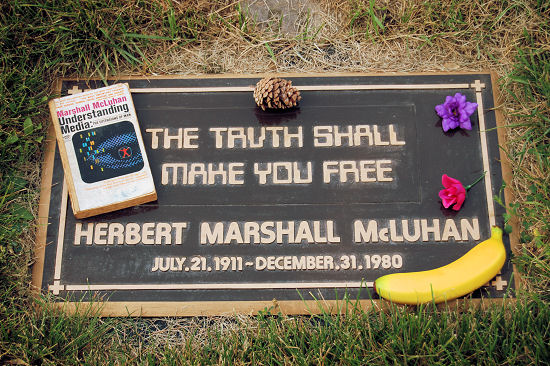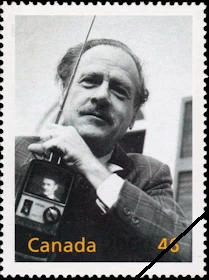
Marshall McLuhan
(Herbert Marshall McLuhan)
Holy Cross Catholic Cemetery
Thornhill, Ontario
Canada
“The medium is the message.”
—Marshall McLuhan

Marshall McLuhan
(Herbert Marshall McLuhan)
Holy Cross Catholic Cemetery
Thornhill, Ontario
Canada
Marshall McLuhan, a professor and author, was Canada's best known public intellectual in the 1960s and 1970s. His ideas and theories on modern media and its impact on culture and society were widely discussed and debated, particularly in academia, though his fame extended far beyond the classroom. He appeared on numerous television and radio shows and was featured in many magazine articles, including the cover of the March 6, 1967 issue of Newsweek magazine. He sat for a talk with Playboy magazine for their well-known 'Playboy Interview' feature in March 1969. In 1977 he had a small cameo role as himself in Woody Allen's Oscar-winning movie, Annie Hall.
His most famous and influential book, Understanding Media, first published in 1964, is still in print and widely available in several different editions. This book is on the 101 Bananas Required Reading List for the Human Race, and the staff and management of 101 Bananas encourages everyone to read it.
In 1994 a Canadian group called Radio Free Vestibule released a CD entitled "Sketches, Songs and Shoes." (Now out of print.) One track was a hilarious parody poking fun at McLuhan's reputation in some quarters as an intellectual for hipsters. It was sort of a spoken poem with musical chorus interludes and reads like an electronic-era update to John Wayne in Stagecoach or Gary Cooper in High Noon:
|
The Ballad of Marshall McLuhan
Once upon a time there was a town,
Marshall...
Well they gave him a star and put it on his chest
Marshall McLuhan,
Well then came the fateful day when a tall dark man all
So Marshall shot him. Marshall McLuhan,
—Radio Free Vestibule |

Canadian stamp honoring
Marshall McLuhan, issued in 2000.